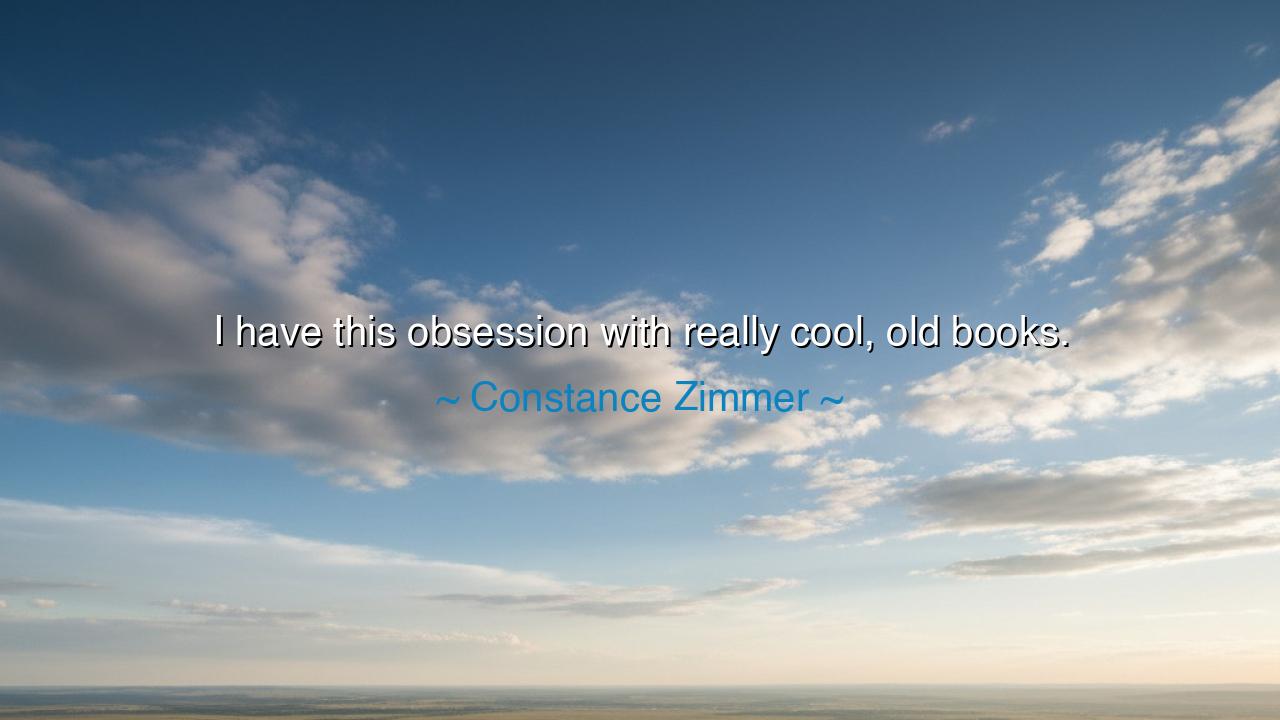
I have this obsession with really cool, old books.






"I have this obsession with really cool, old books." – Constance Zimmer.
In this seemingly simple declaration, Constance Zimmer speaks to a profound love for the written word, a deep connection to history, and a reverence for the timeless knowledge contained within the pages of old books. These are not just objects, but vessels of wisdom—books that have survived the test of time, each with its own story to tell. Zimmer’s obsession reflects the power that books, especially those of ancient or historical significance, hold over the human spirit. They are more than mere paper and ink; they are bridges to other eras, ideas, and ways of thinking.
The ancient philosophers understood the importance of preserving knowledge for future generations. Plato, in his writings, often spoke of the great value in passing down wisdom through the ages, believing that the written word was a key medium for preserving thought, philosophy, and culture. In the Republic, Plato emphasizes the need to record ideas for posterity, for only by preserving knowledge can humanity hope to avoid the mistakes of the past. Zimmer’s obsession with old books echoes this ancient wisdom, for books are not just repositories of facts, but beacons of enlightenment that have illuminated the minds of those who have come before us.
Consider the example of the Library of Alexandria, one of the greatest repositories of knowledge in the ancient world. It is said that scholars from all over the world journeyed to Alexandria to study its vast collection of works—ancient texts, scrolls, and manuscripts that contained the sum of human knowledge at the time. The importance of these old books cannot be overstated: they were the foundation upon which much of our modern thinking was built. Just as Zimmer’s affection for old books signals a deep respect for history, the Library of Alexandria represented humanity’s collective effort to preserve knowledge, to ensure that the lessons of the past were not forgotten but were passed down to future generations.
The power of old books also lies in their mystery and timelessness. They are not just relics of the past but windows into forgotten worlds. When one opens an old book, it is as though they are communing with the minds of those who lived centuries ago. The wisdom within these pages often transcends time, offering insights that are as relevant today as they were when first written. Take, for example, the ancient works of Homer—the Iliad and the Odyssey. These epic tales have endured for thousands of years, and their themes of heroism, love, and human struggle continue to resonate with readers across cultures and eras. The power of an old book is in its ability to speak across time, to connect us to the hearts and minds of those who lived before us.
Zimmer’s obsession with these old books serves as a reminder that history is not a distant past, but an ongoing conversation. By immersing ourselves in the texts of old, we can find guidance and reflection for the challenges we face today. This is not a mere hobby, but a practice—a way to engage with the collective wisdom of humanity. It is a journey that requires not just reading, but deep contemplation, for the true value of these books lies in how they shape and transform the mind. Her obsession is a form of reverence, a recognition that the old books are not simply outdated relics, but repositories of truths that have withstood the test of time.
The ancient Egyptians, who crafted their papyrus scrolls with such care and reverence, also understood the importance of knowledge as something to be preserved and revered. The Book of the Dead, an ancient Egyptian text, was not merely a guide for the afterlife but a spiritual and intellectual framework for understanding the human experience. Through their sacred texts, the Egyptians sought to pass on their wisdom, to ensure that the knowledge and rituals of their civilization would endure long after their time. In the same way, Zimmer’s obsession with old books can be seen as a recognition of the sacredness of knowledge and the desire to keep the fire of human wisdom burning bright for future generations.
What lesson, then, can we take from this reverence for old books? We must remember that knowledge is not simply for the present moment but is part of an ongoing, timeless conversation. Each book, each text, holds a piece of our collective history and wisdom. Embrace the old, for in the pages of history, we find the tools not just to understand the past, but to shape the future. Just as Zimmer honors the power of these books, we too must cultivate a love for learning, seek out the wisdom of the ancients, and carry forward the knowledge that will illuminate our paths. Let us not be content with the fleeting, but instead, reach into the depths of the past to bring forth the insights that will guide us toward a brighter future.
Thus, let us hold dear the old books, for they are more than just relics; they are treasures that continue to speak to us, urging us to learn, to grow, and to remember the wisdom of those who came before us. Just as the ancients cherished their scrolls and manuscripts, so too must we treasure the knowledge that has been passed down through the ages, for it is a gift that continues to illuminate the path of humanity.






AAdministratorAdministrator
Welcome, honored guests. Please leave a comment, we will respond soon